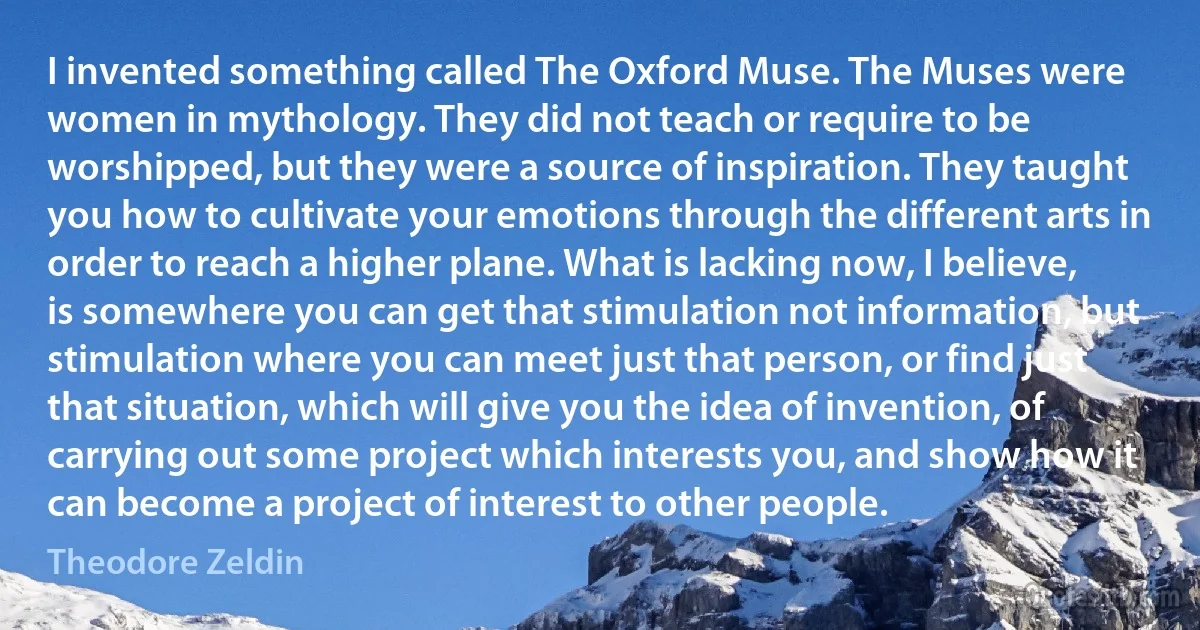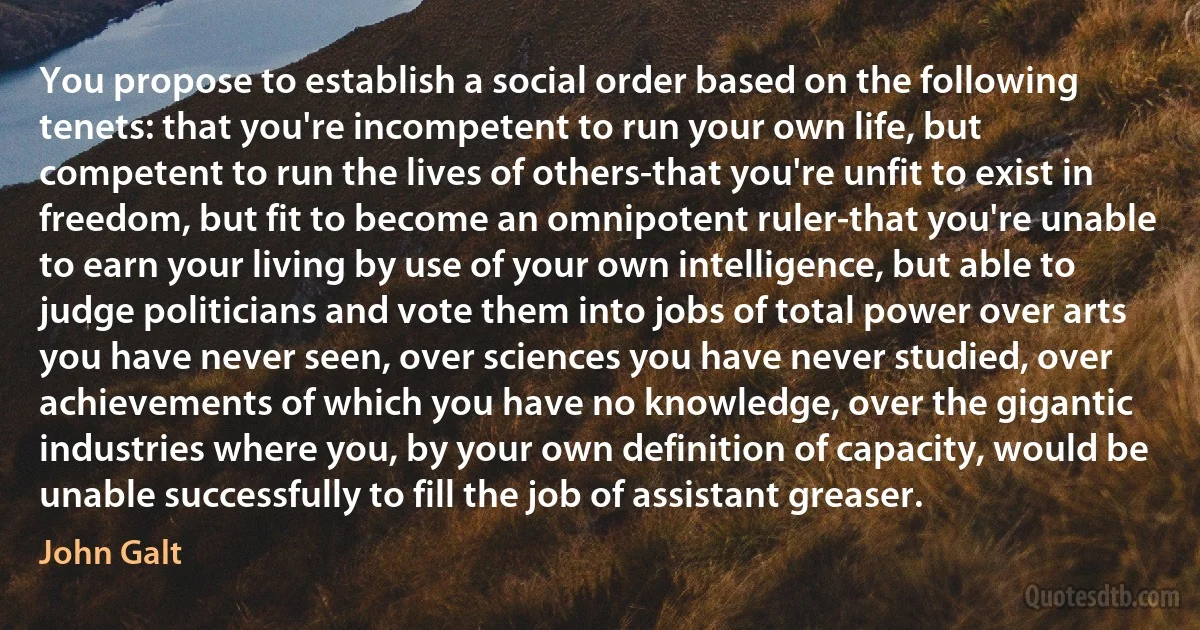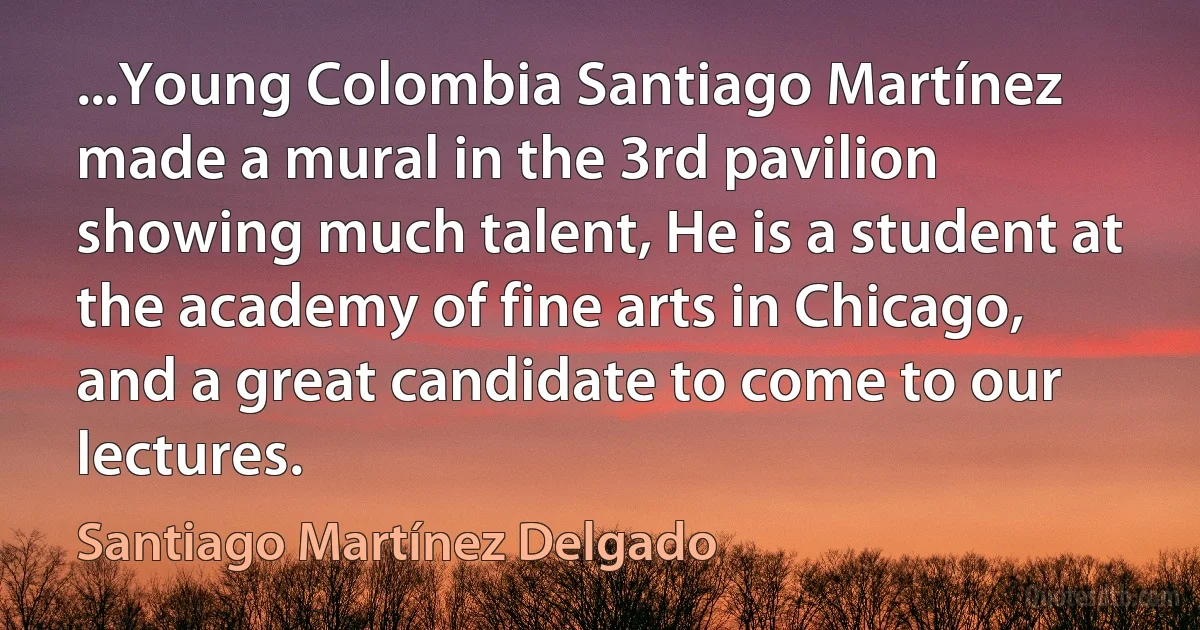Arts Quotes - page 53
Perhaps what I would like is a truly democratic culture. Not a polemic nor a moralistic culture in the arts but a culture which permits one man to speak to another honestly and modestly and in freedom and to say what he thinks and what he feels, to express his doubts and his fears, his immoral as well as his moral impulses, to say what he thinks is true and what he thinks is false, and what he likes and what he does not like. What I am against is that we should all engage in the most vigorous and most polemic lying to each other for each other's benefit. - Who could have the conceit, the self-confidence to believe that that is what we should do throughout all the rest of human history?

George Oppen
... I have come gradually to understand that the liberal arts cliché about teaching you how to think is actually shorthand for a much deeper, more serious idea: learning how to think really means learning how to exercise some control over how and what you think. It means being conscious and aware enough to choose what you pay attention to and to choose how you construct meaning from experience. Because if you cannot exercise this kind of choice in adult life, you will be totally hosed. Think of the old cliché about quote the mind being an excellent servant but a terrible master. This, like many clichés, so lame and unexciting on the surface, actually expresses a great and terrible truth. It is not the least bit coincidental that adults who commit suicide with firearms almost always shoot themselves in: the head. They shoot the terrible master.

David Foster Wallace
The society was the nearest thing to perfection that had ever existed; vital without being violent, stable without being stagnant. This society had resulted from a number of factors, the most important being a small population served by a sophisticated technology and an equally sophisticated administrative system. The arts were alive, there was universal literacy, the philosophies flourished.

Michael Moorcock
We are one, we are all brothers and sisters, but the people of the world do not know this. So this was the teaching, but how do you teach it? As young people, John Lennon, George Harrison, myself, Carlos Santana and other spiritual seekers in pop music, we wanted to know the answer but we found a question: How do you convince the rest of the western world that they are ill, they are mentally ill, that they have a sickness and that they have lost the way? How do you teach that? You cannot teach that in the normal sense. You have to encourage a spiritual call, so we devoted ourselves to making songs which would have a spiritual call inside of them, hoping to awaken an awareness with this music. And other people in the arts felt the same...

Donovan
Our job is to reclaim America for Christ, whatever the cost. As the vice regents of God, we are to exercise godly dominion and influence over our neighborhoods, our schools, our government, our literature and arts, our sports arenas, our entertainment media, our news media, our scientific endeavors -- in short, over every aspect and institution of human society.

James Kennedy (televangelist)
Forced to depend upon popularity instead of hereditary power, the dictatorships for the most part kept out of war, supported religion, maintained order, promoted morality, favored the higher status of women, encouraged the arts, and lavished revenues upon the beautification of their cities. And they did all these things, in many cases, while preserving the forms and procedures of popular government, so that even under despotism the people learned the ways of liberty. When the dictatorship had served to destroy the aristocracy the people destroyed the dictatorship; and only a few changes were needed to make the democracy of freemen a reality as well as a form.

Will Durant
To draw a parallelism between the arts and the sciences is always dangerous, for the relationships between either and the society in which they flourish is quite different. Yet the sciences too in their way reflected the dual revolution, partly because it made specific new demands on them, partly because it opened new possibilities for them and faced them with new problems, partly because its very existence suggested new patterns of thought.

Eric Hobsbawm
One of the most obvious uses [of literature], I think, is its encouragement of tolerance. In the imagination our own beliefs are also only possibilities, but we can also see the possibilities in the beliefs of others. Bigots and fanatics seldom have any use for the arts, because they're so preoccupied with their beliefs and actions that they can't see them as also possibilities.

Northrop Frye
In a world populated by people who believe that through more and more information, paradise is attainable, the computer scientist is king. But I maintain that all of this is a monumental and dangerous waste of human talent and energy. Imagine what might be accomplished if this talent and energy were turned to philosophy, to theology, to the arts, to imaginative literature or to education? Who knows what we could learn from such people - perhaps why there are wars, and hunger, and homelessness and mental illness and anger.

Neil Postman
To me, the body says what words cannot. I believe that dance was the first art. A philosopher has said that dance and architecture were the first arts. I believe that dance was first because it's gesture, it's communication. That doesn't mean it's telling a story, but it means it's communicating a feeling, a sensation to people.
Dance is the hidden language of the soul, of the body. And it's partly the language that we don't want to show.

Martha Graham
Only those with their eyes open to the world of nature are capable of uncovering its truth. Everything springs from a sense of gratitude toward nature. Aikido, though praised as a healthful system of self-defense techniques, would be nothing apart from the laws of the great universe. The martial way begins and ends with courtesy, itself an attitude of thankfulness to and reverence for nature. To be mistaken on this basic point is to make of the martial arts no more than weapons of injury and death.
The very name Aikido indicates its dependence on the laws of nature, which we term ki. Aikido means the way to harmony with ki. That is to say, Aikido is a discipline to make the heart of nature our own heart, to understand love for all things, and to become one with nature. Techniques and physical strength have limits; the great way of the universe stretches to infinity.

Koichi Tohei
Julian was into black magic. Well, okay-he never called it that. But something to do with the dark arts. "Magick” with a K, that Aleister Crowley bullshit. So fucking pretentious. Most of Crowley's quote-unquote magick was just a way of getting laid-he was a total con man. If you can read his stuff with a straight face, you're a stronger woman than me.

Elizabeth Hand
I don't think that Kandinsky was ever really a communist. He just happened to be in Russia [Kandinsky went to Russia in 1914, because of the outbreak of the First World War, ànd his Russsian nationality] and to become involved in some revolutionary artistic activities because of his reputation as a revolutionary in the arts. In any case, he left Russia as soon as an opportunity arose. But we had parted, by that time, and I prefer not to express any opinion on Kandinsky's later ideas and beliefs, with which I was never familiar.

Wassily Kandinsky
The first great frontal assault on the Enlightenment was launched by Jean-Jacques Rousseau (1712-1778). Rousseau has a well-deserved reputation as the bad boy of eighteenth century French philosophy. In the context of Enlightenment intellectual culture, Rousseau's was a major dissenting voice. He was an admirer of all things Spartan-the Sparta of militaristic and feudal communalism-and a despiser of all things Athenian-the classical Athens of commerce, cosmopolitanism, and the high arts. Civilization is thoroughly corrupting, Rousseau argued -- not only the oppressive feudal system of eighteenth-century France with its decadent and parasitical aristocracy, but also its Enlightenment alternative with its exaltation of reason, property, the arts and sciences. Name a dominant feature of the Enlightenment, and Rousseau was against it.

Jean-Jacques Rousseau
In seventeenth- and eighteenth-century France, race was already a weapon in the struggle between absolutism, aristocracy, and the middle class. The warfare spread to the arts and philosophy in the nineteenth century, by which time independent shoots in other cultures had also borne fruit, leaving the grand harvesting on a world-wide scale to our generation.
Viewed in the light of such facts, the race question appears a much bigger affair than a trumped-up excuse for local persecution. It becomes rather a mode of thought endemic in Western civilization. It defaces every type of mental activity - history, art, politics, science and social reform.

Jacques Barzun
Poetry is not; or seems not to be. But it appears that among the great conflicts of this culture, the conflict in our attitude toward poetry stands clearly lit. There are no guards built up to hide it. We call see its expression, and we can see its effects upon us. We can see our own conflict and our own resource if we look, now, at this art, which has been made of all the arts the one least acceptable.
Anyone dealing with poetry and the love of poetry must deal, then, with the hatred of poetry, and perhaps even Ignore with the indifference which is driven toward the center. It comes through as boredom, as name-calling, as the traditional attitude of the last hundred years which has chalked in the portrait of the poet as he is known to this society, which, as Herbert Read says, "does not challenge poetry in principle it merely treats it with ignorance, indifference and unconscious cruelty."
Poetry is foreign to us, we do not let it enter our daily lives.

Muriel Rukeyser
Today's novelist is not only limited by the thin subject matter of personal experience, but by the pinched clinical conventions of the Health generation. Faced with Othello, say, he would have to divide the man into departments, like a liberal arts course. Race relations - that's still a subject, although of course whites can't write about blacks and vice versa; sexual politics (somehow); Othello's ultimate therapy and decision to endure. Since jealousy is now curable, like TB, we can't have people dying of it anymore. A few rap sessions, some fearless touching, and a new sense of self-worth would have Othello and Iago and Hamlet and Juliet back on their feet in no time; and Fiction struggling.

Wilfrid Sheed
I have waited a while before saying anything about the Un-American Activities Committee's current investigation of the Hollywood film industry. I would not be very much surprised if some writers or actors or stagehands, or what not, were found to have Communist leanings, but I was surprised to find that, at the start of the inquiry, some of the big producers were so chicken-hearted about speaking up for the freedom of their industry.
One thing is sure - none of the arts flourishes on censorship and repression. And by this time it should be evident that the American public is capable of doing its own censoring. Certainly, the Thomas Committee is growing more ludicrous daily.

Eleanor Roosevelt
We need in this modern world... an incredible number of very highly trained technicians and professional men... But nothing will be gained unless [they] are also educated as citizens... to know about the ends, the beliefs, the purposes, to... which their craft and skill is to contribute... about the basic issues which... every generation of free men has had to decide... [I]t is the liberal arts... that is our lighthouse in the dark and uncharted waters of the postwar world.

Peter Drucker



